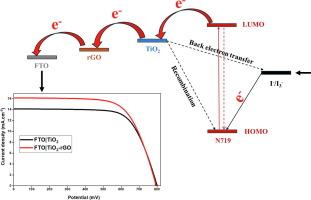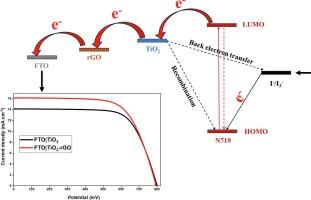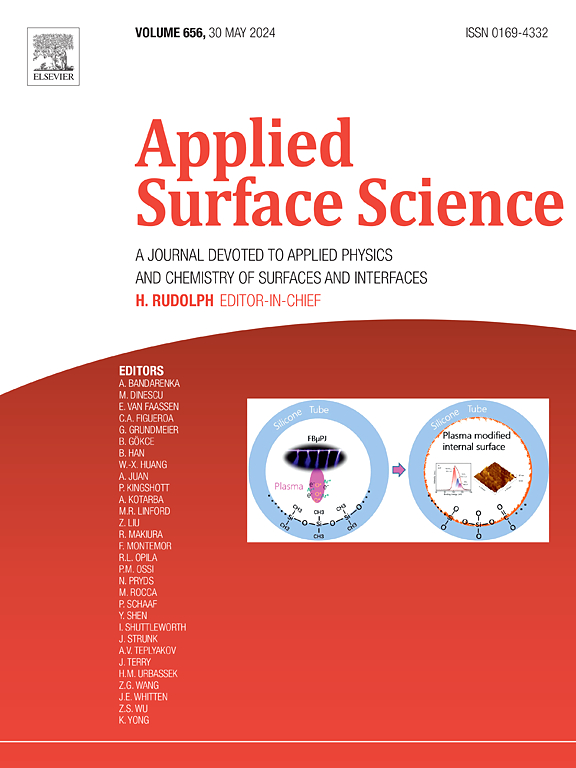Surface modification of TiO2 photoanode in dye-sensitized solar cells using reduced graphene oxide: A computational and experimental study
IF 6.3
2区 材料科学
Q2 CHEMISTRY, PHYSICAL
引用次数: 0
Abstract
This study investigated the modification of TiO2 photoanodes using reduced graphene oxide (rGO) to enhance electron transport channels and prevent recombination processes, thereby improving the photovoltaic performance. Through the ultraviolet (UV)-assisted photoreduction of GO on TiO2 coated on a fluoride tin oxide substrate (FTO|TiO2), we demonstrated the successful integration of rGO. This was evidenced by the increased Csp2 content observed during X-ray photoelectron spectroscopy and reduced photogenerated electron–hole recombination observed during photoluminescence spectroscopy. The incorporation of rGO significantly improved the photocurrent density and power conversion efficiency (PCE). A 12 % increase was observed in the PCE, which reached 8.5 % when the UV irradiation time was optimized from 10 to 15 min compared with the 7.57 % in the standard cell (rGO-0 min). Electrochemical impedance spectroscopy confirmed that the optimized rGO content enhanced the electron lifetime and recombination resistance, attributable to the high conductivity and large specific surface area of rGO. DFT simulation further elucidated how improved charge separation and transport mechanisms of TiO2–rGO heterojunction. This study highlights the potential of TiO2–rGO materials as promising electrodes for improving the efficiency, capacity, and stability of dye-sensitized solar cells.


使用还原氧化石墨烯对染料敏化太阳能电池中的 TiO2 光阳极进行表面改性:计算与实验研究
本研究探讨了利用还原氧化石墨烯(rGO)对二氧化钛光阳极进行改性,以增强电子传输通道和防止重组过程,从而提高光伏性能。通过在氟化锡氧化物衬底(FTO|TiO2)上涂覆的二氧化钛上进行紫外线(UV)辅助的 GO 光还原,我们证明了 rGO 的成功整合。在 X 射线光电子能谱中观察到的 Csp2 含量增加,以及在光致发光光谱中观察到的光生电子-空穴重组减少,都证明了这一点。rGO 的加入大大提高了光电流密度和功率转换效率(PCE)。与标准电池(rGO-0 分钟)的 7.57% 相比,当紫外线照射时间从 10 分钟优化到 15 分钟时,PCE 提高了 12%,达到 8.5%。电化学阻抗光谱证实,优化的 rGO 含量提高了电子寿命和抗重组能力,这归功于 rGO 的高导电性和大比表面积。DFT 模拟进一步阐明了 TiO2-rGO 异质结的电荷分离和传输机制是如何得到改善的。这项研究强调了 TiO2-rGO 材料作为电极在提高染料敏化太阳能电池的效率、容量和稳定性方面的潜力。
本文章由计算机程序翻译,如有差异,请以英文原文为准。
求助全文
约1分钟内获得全文
求助全文
来源期刊

Applied Surface Science
工程技术-材料科学:膜
CiteScore
12.50
自引率
7.50%
发文量
3393
审稿时长
67 days
期刊介绍:
Applied Surface Science covers topics contributing to a better understanding of surfaces, interfaces, nanostructures and their applications. The journal is concerned with scientific research on the atomic and molecular level of material properties determined with specific surface analytical techniques and/or computational methods, as well as the processing of such structures.
 求助内容:
求助内容: 应助结果提醒方式:
应助结果提醒方式:


